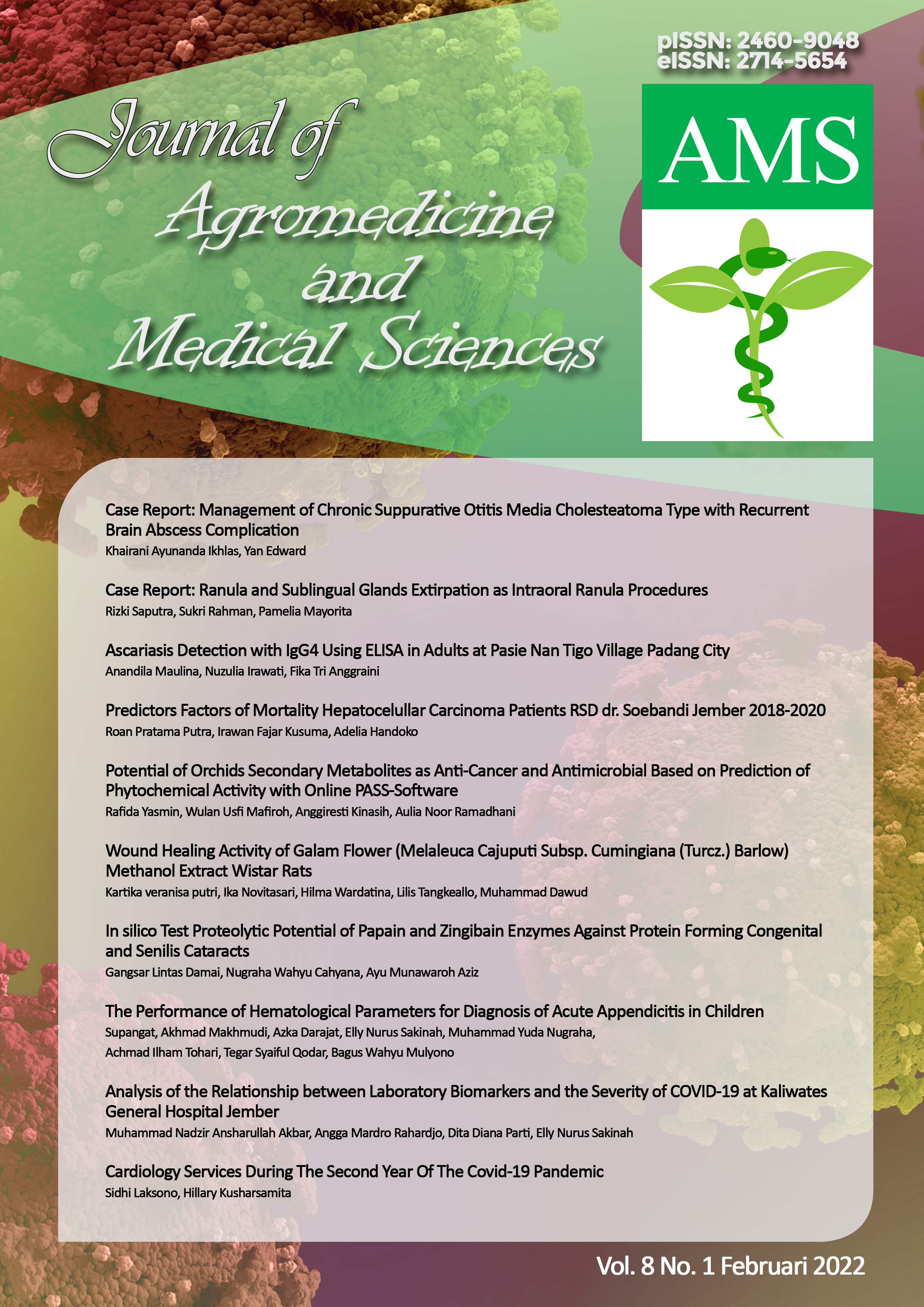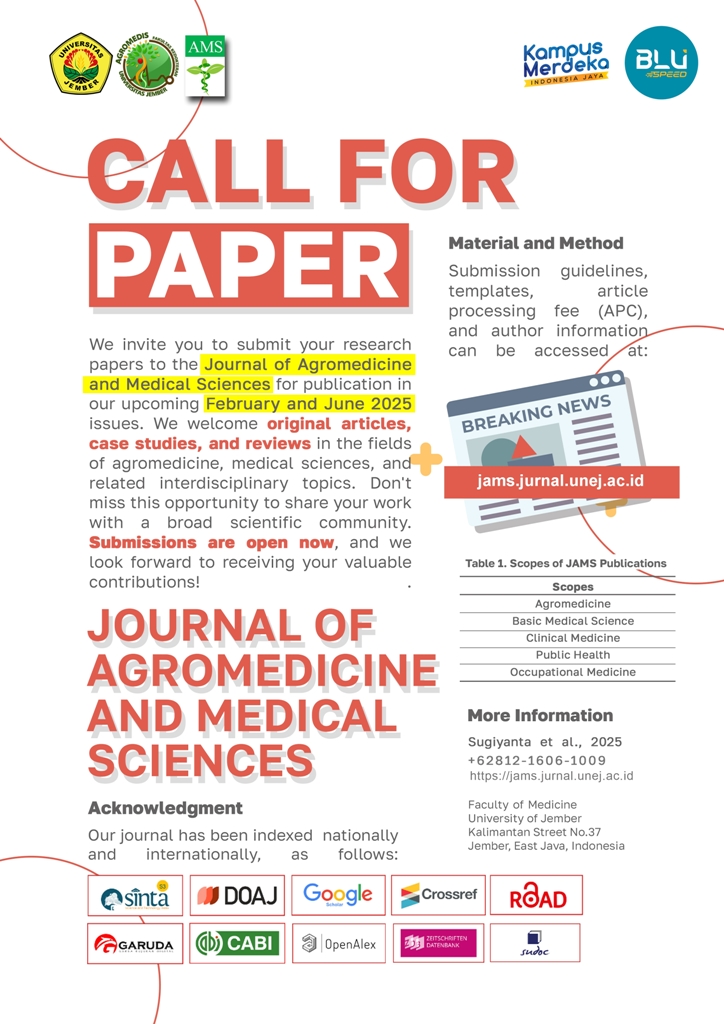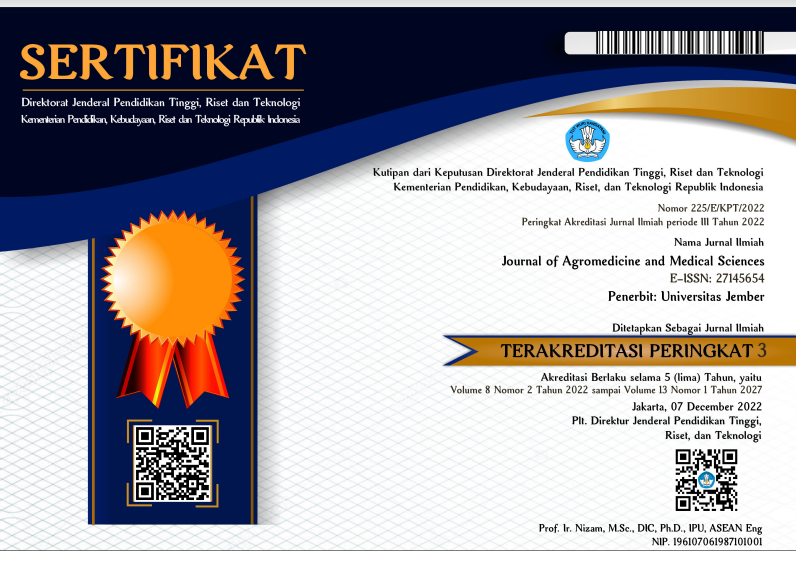Analysis of the Relationship between Laboratory Biomarkers and the Severity of COVID-19 at Kaliwates General Hospital Jember
DOI:
https://doi.org/10.19184/ams.v8i1.29062Abstract
Coronavirus Disease 2019 (COVID-19) has become a global health problem since the WHO declared the disease a pandemic. In July 2021, Indonesia experienced a very sharp spike in cases and an increase in mortality due to COVID-19, including at the Kaliwates General Hospital in Jember. Laboratory biomarkers in the form of Neutrophile Lymphpocyte Ratio (NLR), D-dimer, and SpO2 can be a clue to assess the severity of COVID-19 patients. This research is an observational analytical study using a Cross Sectional Study with the aim of knowing the relationship between laboratory biomarkers and the severity of COVID 19 at RSU Kaliwates Jember. This study uses secondary data in the form of medical records of COVID-19 patients during July 2021 with a total of 50 samples. The results of this study were carried out by the Spearman correlation test and it was found that there was a correlation between NLR values ​​and oxygen saturation with the severity of COVID-19, but there was no relationship between D-dimer levels and the severity of COVID-19. The conclusion of this study is that NLR biomarkers and oxygen saturation can be used as predictors of the severity of COVID-19.
Downloads
References
Dhont, S., Derom, E., Van Braeckel, E., Depuydt, P., & Lambrecht, B. N. (2020). The pathophysiology of “happy†hypoxemia in COVID-19. Respiratory Research, 21(1). https://doi.org/10.1186/S12931-020-01462-5
Frater, J. L., Zini, G., d’Onofrio, G., & Rogers, H. J. (2020, June 1). COVID-19 and the clinical hematology laboratory. International Journal of Laboratory Hematology. Blackwell Publishing Ltd. https://doi.org/10.1111/ijlh.13229
Li, X., Liu, C., Mao, Z., Xiao, M., Wang, L., Qi, S., & Zhou, F. (2020). Predictive values of neutrophil-to-lymphocyte ratio on disease severity and mortality in COVID-19 patients: a systematic review and meta-analysis. Critical Care, 24(1). https://doi.org/10.1186/s13054-020-03374-8
MejÃa, F., Medina, C., Cornejo, E., Morello, E., Vásquez, S., Alave, J., … Málaga, G. (2020). Oxygen saturation as a predictor of mortality in hospitalized adult patients with COVID-19 in a public hospital in Lima, Peru. PLOS ONE, 15(12), e0244171. https://doi.org/10.1371/JOURNAL.PONE.0244171
Mus, R., Thaslifa, T., Abbas, M., & Sunaidi, Y. (2021). Studi Literatur: Tinjauan Pemeriksaan Laboratorium pada Pasien COVID-19. Jurnal Kesehatan Vokasional, 5(4), 242. https://doi.org/10.22146/jkesvo.58741
Nakshbandi, G., Moor, C. C., & Wijsenbeek, M. S. (2020). Home monitoring for patients with ILD and the COVID-19 pandemic. The Lancet Respiratory Medicine, 8(12), 1172–1174. https://doi.org/10.1016/S2213-2600(20)30452-5
Pimentel, G. D., Dela Vega, M. C. M., & Laviano, A. (2020). High neutrophil to lymphocyte ratio as a prognostic marker in COVID-19 patients. Clinical Nutrition ESPEN, 40, 101–102. https://doi.org/10.1016/j.clnesp.2020.08.004
Poudel, A., Poudel, Y., Adhikari, A., Aryal, B. B., Dangol, D., Bajracharya, T., … Gautam, R. (2021). D-dimer as a biomarker for assessment of COVID-19 prognosis: D-dimer levels on admission and its role in predicting disease outcome in hospitalized patients with COVID-19. PLOS ONE, 16(8), e0256744. https://doi.org/10.1371/JOURNAL.PONE.0256744
Pourbagheri-Sigaroodi, A., Bashash, D., Fateh, F., & Abolghasemi, H. (2020, November 1). Laboratory findings in COVID-19 diagnosis and prognosis. Clinica Chimica Acta. Elsevier B.V. https://doi.org/10.1016/j.cca.2020.08.019
Sandor-Keri, J., Benedek, I., Polexa, S., & Benedek, I. (2021). The link between SARS-CoV-2 infection, inflammation and hypercoagulability-impact of hemorheologic alterations on cardiovascular mortality. Journal of Clinical Medicine, 10(14). https://doi.org/10.3390/JCM10143015
Sukrisman, L., Sinto, R., & Priantono, D. (2021). Hematologic Profiles and Correlation Between Absolute Lymphocyte Count and Neutrophil/Lymphocyte Ratio with Markers of Inflammation of COVID-19 in an Indonesian National Referral Hospital. International Journal of General Medicine, Volume 14, 6919–6924. https://doi.org/10.2147/IJGM.S337440
Wratsangka, R., & Og, S. (n.d.). Desain Penelitian.
X, X., M, W., S, Z., J, H., & W, C. (2020). [An increased neutrophil/lymphocyte ratio is an early warning signal of severe COVID-19]. Nan Fang Yi Ke Da Xue Xue Bao = Journal of Southern Medical University, 40(3), 333–336. https://doi.org/10.12122/J.ISSN.1673-4254.2020.03.06
Yao, Y., Cao, J., Wang, Q., Shi, Q., Liu, K., Luo, Z., … Hu, B. (2020). D-dimer as a biomarker for disease severity and mortality in COVID-19 patients: a case control study. Journal of Intensive Care 2020 8:1, 8(1), 1–11. https://doi.org/10.1186/S40560-020-00466-Z
Zahorec, R., Hulin, I., & Zahorec, P. (2020). Rationale use of neutrophil-to-lymphocyte ratio for early diagnosis and stratifi cation of COVID-19. Bratislava Medical Journal, 121(7), 466–470. https://doi.org/10.4149/BLL_2020_077























